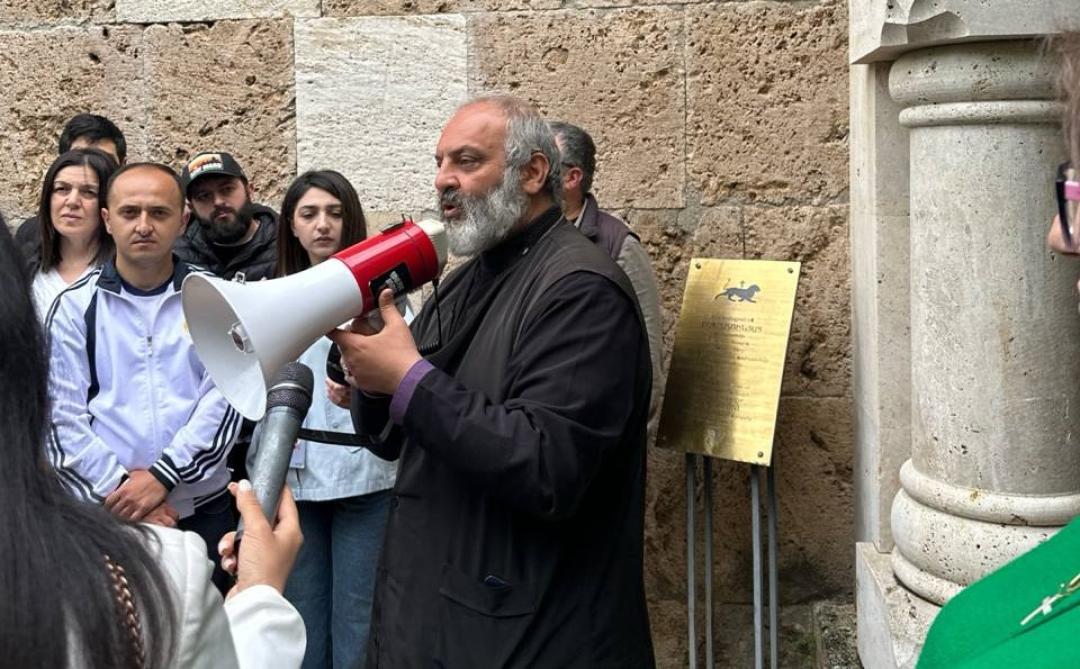
Yerevan March: Armenians Demand Transparency in Border Talks

On May 3, several public organizations in Armenia issued a statement calling for the Armenian government to ensure transparency in the border delimitation process with Azerbaijan. These organizations have raised serious concerns regarding the methods and pace of the delimitation and demarcation activities in the Tavush region, claiming that these actions contradict Armenia’s internal legislation and jeopardize the safety and normal life of the civilian population.
The statement emphasized the importance of adhering to international and Armenian domestic laws during the delimitation process. It accused the process of being influenced by the threat of aggression from Azerbaijan, thus suggesting that it strays from the norms of international law. The organizations highlighted that lasting peace could only be achieved if threats and actual use of force were eliminated. They pointed out that despite ongoing conflicts, including those from the 1990s and as recent as 2021-2022, Azerbaijan has not taken credible steps to demilitarize the occupied Armenian territories.
Furthermore, the organizations criticized the current approach of using the principle of uti possidetis to convert administrative borders from the Soviet era directly into state borders, which has been a point of contention. The recent remarks by Armenia's Minister of Foreign Affairs revealed that Azerbaijan has not agreed to respect these Soviet-era administrative boundaries as the basis for state borders.
Amid these tensions, police blocked access to the village of Kirants in the Tavush region for the second consecutive day. On May 3, key figures, including Archbishop Bagrat Galstanyan of the Tavush Diocese of the Armenian Apostolic Church, MP Garnik Danielyan from the opposition bloc "Armenia," and political scientist Suren Petrosyan, who are leading protests in the border area, were denied entry. Despite their requests, authorities did not permit them to visit Kirants, even briefly, to speak with residents.
Moreover, Archbishop Bagrat Galstanyan has been actively leading the "Tavush for the Motherland" protest movement, which began in Kirants and is making its way to Yerevan, with stops including Sarigyukh, Ijevan, and the Hakhartsin Monastery. The procession, which started on May 4, has seen participation from several members of the Armenian parliament and received a warm welcome in Dilijan. The movement aims to reach Yerevan by May 9 to press for the cessation of the border delimitation and demarcation processes.
On May 6, Alen Simonyan, the Speaker of the Armenian Parliament, discussed the only constitutional method for changing power in Armenia, stating that it can occur through parliamentary elections scheduled for 2026. Simonyan acknowledged the increasing participation in the procession, expressing indifference to its size. "I do not know whether the number of participants in the procession is increasing or not. Let it increase, let them come and speak out," he commented. He drew a distinction between the current movement and the 2018 protests that eventually led to a government change. Unlike the previous movement, the current government came into power through an electoral process, where, according to Simonyan, the people of Armenia initially chose their leaders in 2018 and reaffirmed their choice in the subsequent 2021 elections. Additionally, Simonyan suggested that the current protests in Tavush bear signs of foreign influence, citing the involvement of bloggers with specific geopolitical orientations as evidence. He expressed frustration with the repetitive nature of the protests, calling for innovation in the approach: "How many times can you, using the same logic, just by changing the players, try to repeat what we did? Come up with something new!" When pressed on the number of protestors required for the government to consider resigning, Simonyan responded facetiously, "I cannot name the number, let’s say 2337."
See Also


Simonyan: “Armenia Should Trade with Turkey and Azerbaijan Instead of Closing Borders”

Mirzoyan Meets US Deputy Assistant Secretary Joshua Huck

Azerbaijani President Holds Talks with UAE and German Business Delegations on Economic Cooperation

Grigoryan Confirms Armenia’s Readiness to Dissolve OSCE Minsk Group Upon Peace Treaty Signing

